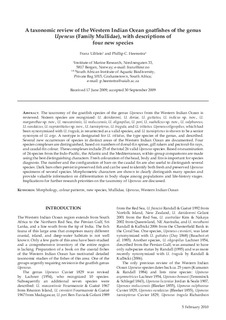A taxonomic review of the Western Indian Ocean goathfishes of the genus Upeneus (Family Mullidae), with descriptions of four new species
Journal article, Peer reviewed
Permanent lenke
http://hdl.handle.net/11250/108378Utgivelsesdato
2010-02-05Metadata
Vis full innførselSamlinger
- Articles [3012]
Sammendrag
The taxonomy of the goatfish species of the genus Upeneus from the Western Indian Ocean is reviewed. Sixteen species are recognized: U. davidaromi, U. doriae, U. guttatus, U. indicus sp. nov., U. margarethae sp. nov., U. mascareinsis, U. moluccensis, U. oligospilus, U. pori, U. suahelicus sp. nov., U. sulphureus, U. sundaicus, U. supravittatus sp. nov., U. taeniopterus, U. tragula, and U. vittatus. Upeneus oligospilus, which had been synonymized with U. tragula, is resurrected as a valid species, and U. taeniopterus is shown to be a senior synonym of U. arge. A neotype is designated for U. vittatus, the type species of the genus, and described. Several new occurrences of species in distinct areas of the Western Indian Ocean are documented. Four species complexes are distinguished, based on numbers of dorsal-fin spines, gill rakers and pectoral-fin rays, and caudal-fin color. These complexes include 25 of the total 26 valid Upeneus species. Based on examination of 24 species from the Indo-Pascific, the Atlantic and the Mediterranean, within-group comparisons are made using the best distinguishing characters. Fresh colouration of the head, body and fins is important for species diagnosis. The number and the configuration of bars on the caudal fin are also useful to distinguish several species. Dark bars often persist in preserved fish and can be used to identify both fresh and preserved Upeneus specimens of several species. Morphometric characters are shown to clearly distinguish many species and provide valuable information on differentiation in body shape among populations and life-history stages. Implications for further research priorities on the taxonomy of Upeneus are discussed.
Beskrivelse
Journal homepage: http://www.bioline.org.br/sm
